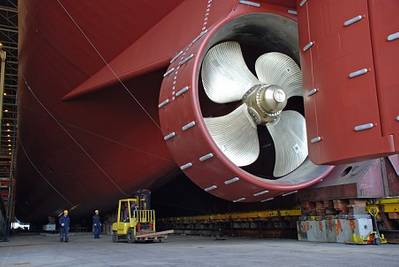Peter De Vos Appointed Marine Propulsion Course Trainer
The ninth edition of the international HME Marine Propulsion training series starts in September. It will be a new experience for Peter de Vos, Assistant Professor of Marine Engineering at Delft Technical University (TU Delft). As the latest addition to the team, De Vos will work closely with Professor Douwe Stapersma in modules 1, 3 and 5.
Peter De Vos graduated cum laude in 2008 on the modeling of a fuel processing plant for the application of fuel cells onboard vessels in the Ship Design, Production and Operation section of the Marine Engineering department at TU Delft. At the time he had been working as a student assistant in the same department for several years, and decided to accept the offer to stay on as a researcher after graduating. That was five years ago. “I have been involved in academic education in the field of maritime platform systems for four years now, and started my doctoral research with the aim to accelerate and improve the design process of these systems,” De Vos explained. Meanwhile, De Vos was named Best Lecturer of 2012 by his second-year students.
De Vos is looking forward to acting as a trainer during the Marine Propulsion Course. “I hope to convey some of my enthusiasm for the subject to the participants and share some insights I’ve discovered along the way. In my opinion, maritime propulsion systems and all auxiliary systems are what make a vessel successful or not. These are the platform systems; systems that are required if other mission-related systems are to function as they should, enabling the vessel to fulfill its mission. In view of this ‘secondary position’, it is no surprise that things go wrong in the design, maintenance or operating of these platform systems. The complex interactions between the systems and/or their functioning outside of the design conditions are especially difficult to understand.
“The Marine Propulsion Course addresses this complex material. Participants will learn about the various systems, their components and their functioning outside the design conditions. With these new insights, participants can better estimate the functioning of these vital systems and be able to design them better. The course therefore supports the maritime industry in building successful vessels.”
The Marine Propulsion Course contributes to a better understanding of the specific characteristics of a vessel, its propulsion chain and the alignment thereof, including the sub-systems and components. The course is held at a university level in which theoretical laws and design rules are related to practical applications.
The Marine Propulsion Course is intended for designers, engineers, project managers and salespersons working at system integrators, propulsion suppliers (engines, propellers), shipping companies, yards, marinas and design companies.
The Marine Propulsion Course consists of the following five modules, which can each be taken separately:
• Propulsion Plant Concepts and Basic Ship Hydrodynamics (September 19, 20)
• Marine Propulsors: Characteristics (October 10, 11)
• Diesel Engines and Gas Turbines: Characteristics (October 31, November 1)
• Electrical Drives: Characteristics (November 14, 15)
• Matching Propulsion Engine and Propulsor (December 12, 13)
The course is provided by experts from the maritime sector. In addition to De Vos, Professor Douwe Stapersma (TU Delft and Royal Netherlands Naval College), Teus van Beek (Wärtsilä Propulsion Netherlands BV), Paul Bracké (Bakker Sliedrecht Electro Industrie BV) and Edwin Bonsen (Voith Turbo BV) will provide interesting and educational two-day modules.
www.hme.nl













